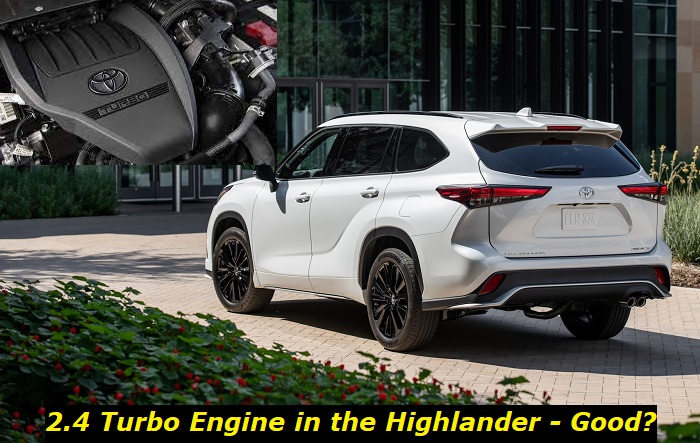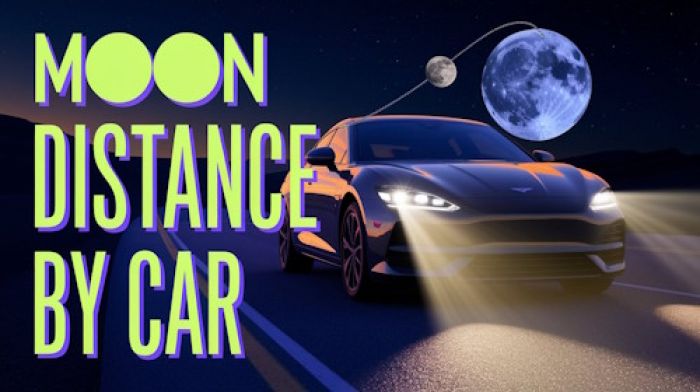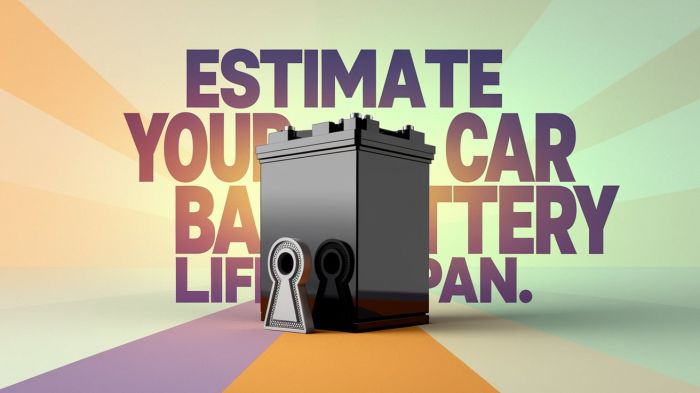Toyota has stepped on the way to discontinue its big gas engines. And the 2.4L Turbo powerplant in the new Highlander substituted the 3.6L V6 that I told you recently in one of my other articles. The V6 was pretty great but the new era of eco-friendly technologies requires new solutions and the smaller turbo engine appeared to be the optimal solution for the Highlander.
Today, I will tell you about the 2.4L T24A-FTS Turbo engine in the new Toyota Highlander. I will cover its common problems and advantages that you may want to know about. Although this engine is extremely new, I already know some insider information from dealership mechanics and also from the first owners of the new Highlander.

Key features and my opinion about the engine
- Production years:2021-now
- Average lifespan of T24A-FTS:160,000-190,000 miles
- Fuel supply type:combined injection D4-ST (direct + port)
- Power range:270-280 hp
- Fuel efficiency:good
- Engine block material:aluminum
- Engine reliability score:medium
- The most common problems:faulty electronics and software, vibrations, it demands extremely high quality of fuel.
Key facts about the new 2.4L engine in the Highlander
Before we start discussing the advantages and possible problems of this engine, let's look at its overall technologies. This is the T24A-FTS engine - the non-hybrid version of this powerplant. It was first introduced in 2021 and has now been used in the Toyota Highlander, Toyota Crown, and also in the Lexus RX350 (here's the article about this engine in the RX) and NX350, in some markets.
The engine belongs to the "Dynamic Forse" family and represents the newest technologies developed by Toyota. I should say right now that the engine is great - it's much better than average powerplants with the same size and power from other manufacturers. Finally, we see something good from Toyota after a series of awful experiments!
Here's what you should know about this unit:
- this is the 2.4L turbocharged 4-cylinder engine that offers 265 horsepower and 308 lb-ft of torque which is more than enough for the vehicle;
- the turbocharger is twin-scroll, it doesn't look too huge for the engine and shouldn't cause a lot of problems;
- the engine has hydraulic lifters, it's equipped with phasers on both camshafts (Dual VVTi), and is overall very efficient;
- the T24A-FTS offers combined injection where direct injection is supported by port injectors to avoid carbon buildup;
- there are balance shafts in this engine to prevent it from vibrating - this makes it pretty comfortable for this SUV;
- the engine is equipped with the 8-speed UA80F Direct Shift transmission made by Toyota - a great choice for this configuration;
- you will get approximately 21 MPG in the city and 28 MPG on highways according toToyota, which is not bad at all.
I should say that this engine seems perfect in its construction. You still shouldn't think that it's a problem-free machine. The fact that you can't find a lot of reports about the problems with the 2.4L Turbo engine in the Highlander comes from the age of this engine. It started selling in the US in 2022 and we still have only low-mileage machines and happy owners.
The engine drives great. Even though this is a non-hybrid machine, it has high torque and enough power to accelerate wonderfully. The overall feeling when you drive is extremely great. I would never say that the Highlander only has 2.4 liters under the hood. And this engine feels even better than the old 3.5L V6 that was used in this model before 2022.
How long will the 2.4L engine last in your Highlander?
Well, in terms of durability, it's too early to make any conclusions. Experts state that the engine should go about 170,000 miles without any serious problems. I can't say it's a fair estimation of the possibilities of this machine but I can't pretend I don't notice the potential problems.
The majority of the issues that experienced mechanics show in this engine will most likely come from ecology equipment. Toyota makes everything possible to keep gas engines on the market and provide you with optimal power and low emission rate. But it takes the engine life to achieve this.
When it comes to other units and parts under the hood of the new Highlander, I don't think they will cause any problems. The 8-speed automatic transmission is just a simple torque-converter transmission with a lot of life in it. It will most likely live as long as the engine and you will only need to change oil and filter in it regularly.
What are the potential problems with the 2.4L in the Toyota Highlander?
Although this engine is really good and deserves your attention, it comes with a bunch of units and parts that can cause serious problems at certain mileage. Please don't take this section for granted. This is just the set of opinions of experts and mechanics who predict the engine may have these problems. We still don't have the stats of breakdowns, recalls, and service bulletins simply because there have been none of these so far.
So, here are the potential problems with the 2.4L T24A-FTS Turbo engine in your Toyota SUV:
1. Issues with the quality of fuel
If you are going to buy cheaper fuel to save you some money, the best idea is to not enter the Toyota dealership with the intention to buy this car. The 2.4L Turbo engine is extremely demanding when it comes to the quality of gasoline. Like any engine with the combined injection (port plus direct), it will fail and require serious and expensive repairs if you experiment with the quality of gasoline.
Another problem is that the injection system is extremely expensive to repair. This is not the engine where you can change the coil and just keep driving. A lot of new technologies are implemented and the engine will just not take the DIY coil change.
2. EGR cooler issues
The Dynamic Force family started in 2017 and I now see that the majority of these engines inherit the problem of EGR cooler leaks from previous generations of Toyota gas engines. Why? Because there is just no way to make the EGR cooler more reliable. It has to work in very harsh conditions under a lot of heat and it will fail eventually.
On one bad day, the EGR cooler will crack and the coolant will quickly leak into the combustion chamber. You will see a lot of white smoke and the coolant level will drop quickly. Driving your Highlander in this condition is not recommended at all. Replacing the EGR cooler is going to cost you quite a lot of money. But, fortunately, it will happen at quite high mileage.
3. Timing chain lifespan
Toyota says the timing chain is here to live forever. They mean, the chain shouldn't break or jump earlier than the engine gets some fatal problem. But I believe you should replace the chain after about 120K miles or as soon as it starts rattling.
Toyota doesn't care about the quality of life of your engine after the warranty period is over, so it's up to you to make proper decisions and care about the engine. Replacing the timing belt on time will prolong the life of the machine. Ignoring the rattling sound will kill the engine there and then.
4. Poor gas mileage
This is probably the only problem you can find in reports on numerous forums. People say "Hey guys, I expected to get 28 MPG on the highway, but I was going at 100 MPH and the Highlander showed 21 MPG only!" or something like that.
You should understand that Toyota tested the gas mileage of this Highlander in perfect condition. And you aren't likely to get the claimed mileage in real life. As far as I know, you can expect to get 19-20 MPG in the city and about 25 MPG on highways. At least, this is what the Lexus RX gets that I had the possibility to test-drive.
How can you prolong the life of this engine?
There is still little known about the T24A-FTS powerplant, so you shouldn't worry about some special steps to take to prolong the lifespan of the machine. But still, you need to know that if you keep doing the following, your Highlander will certainly go more miles:
- change oil and filters strictly as often as the manufacturer recommends;
- check the oil levels - there are some signs that the engine will burn some oil at higher speeds;
- make sure you use high-grade fuel, no cheap gas is OK for this vehicle;
- replace the timing chain kit at about 120,000 miles or as soon as it starts rattling;
- have the engine inspected every 30K miles in the Toyota dealership;
- avoid abusive driving style - this will kill the machine much earlier than you expect.
Other than that, there is nothing you can do to prolong the life of the vehicle. Just watch how it works, go to regular maintenance on time, and don't abuse the car.
Final thoughts
Although I love this engine and think that the 2.4L Turbo is exactly what the new Highlander needed, I still think the engine could be better. It has several flaws that are very well-known to Toyota like the EGR system failure and a thin chain that will not last as long as they say. I don't insist that these issues are very serious, but they will all happen after the warranty period is over, so they will most likely cost you a lot of money to cope with.
But still, if you look at other manufacturers and the engines they offer now, you will understand that the 2.4L T24A-FTS is one of the best powerplants on offer.
Still have questions? Just ask them in the comments below.
About the authors
The CarAraC research team is composed of seasoned auto mechanics and automotive industry professionals, including individuals with advanced degrees and certifications in their field. Our team members boast prestigious credentials, reflecting their extensive knowledge and skills. These qualifications include: IMI: Institute of the Motor Industry, ASE-Certified Master Automobile Technicians; Coventry University, Graduate of MA in Automotive Journalism; Politecnico di Torino, Italy, MS Automotive Engineering; Ss. Cyril and Methodius University in Skopje, Mechanical University in Skopje; TOC Automotive College; DHA Suffa University, Department of Mechanical Engineering






Add comment